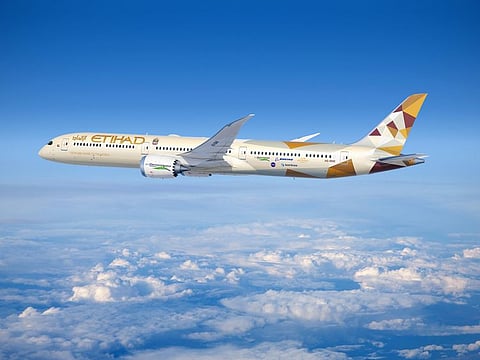Airlines are in a fight for survival, says Etihad CEO
But even the most hardpressed of carriers can't ignore sustainability factor

Also In This Package
Abu Dhabi: The airline industry is in a fight for survival, according to Etihad Aviation Group CEO Tony Douglas.
“The implications of the aftermath of COVID - the likes of which I don’t think any of us have ever seen - suggest that there’s going to be a seismic shape change to the way in which our very industry goes forward,” said the CEO.
“Obviously COVID dominates the aviation agenda at the moment, but in no way does it overshadow the work that was going on and the commitments that we previously made to sustainability.”
Etihad was able to save both time and fuel burn this year on one of its eco flights to Dublin by just making better use of airspace and flight protocols.
“In terms of more efficient air space management between Abu Dhabi and Dublin, optimising the route planning [and having] a continuous ascent and descent saved us 40 minutes on that journey and three tones of CO2,” he added.
“So, whilst all of the range of things that we’re working on are really important, always do the simple things right first.”
And while sustainability will include newer forms of technology and more efficient planes being built – such as the Boeing 787 Dreamliner – making better use of airspace and flying procedures will also play a big role in reducing the carbon footprint for airliners according to Douglas.
“The roads, so to speak, in the skies were almost laid down by the Romans… because many of them haven’t been reorganised ever since,” he said, alluding to outdated travel routes airlines have to traverse.
“They are seldom the optimum route between A and B, and particularly when we look at some of the more busier airspaces around the world.”
A new deal for Etihad
Etihad has entered into an agreement with Boeing to start working on the seventh iteration of the ecoDemonstrator programme to test innovative technologies in the air. The 2020 programme will be the first to use a Boeing 787-10 Dreamliner, as the partnership aims to deliver reduction in fuel consumption and CO2 emissions.
Sign up for the Daily Briefing
Get the latest news and updates straight to your inbox








